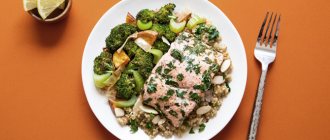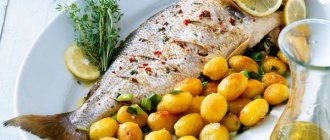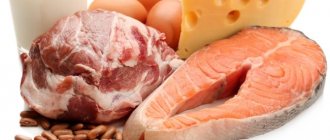What is a balanced diet? This is a certain puzzle in which each product and dish complements each other. This happens due to properly selected ingredients and the balance of proteins, fats and carbohydrates. To maintain health, it is important to eat this way not for a certain period of time, but on an ongoing basis. And we will tell you what the real benefits of a balanced diet are.
Properly selected foods contain all the nutrients that keep the body and mind in healthy balance. Good nutrition can also prevent the development of many diseases, helps maintain normal body weight, provides a lot of positive energy, improves sleep and brain function. It is important not to exclude any important elements from your diet, such as fats or carbohydrates, but remember to control portions.
Now let's talk more about the advantages.
“No” to extra pounds and obesity
Due to the fact that a person on a balanced diet constantly consumes healthy and varied foods rich in nutrients, he is less likely to experience hunger and the desire to snack on something harmful. And the harmful ones are very high in calories. Because these are usually processed foods, fatty meals or sugary snacks. The body does not use this “fuel” to generate energy, but stores it in the body as a “long-term memory”, which gives rise to extra pounds, cellulite, and so on.
Eating carbohydrates such as whole grains, oats, vegetables, fruits, legumes and quinoa (all of which have a low glycemic index) can help you stay healthy and fit over the long term. Of course, if you adhere to a harmonized diet on an ongoing basis. These complex carbohydrates take a long time to break down and release into the bloodstream, thereby protecting the brain from craving desserts and bars. If you combine complex carbohydrates with lean proteins (poultry, rabbit, most seafood, eggs, lean beef, etc.), the metabolism will function in such a way that a person is not in danger of feeling hungry an hour after a balanced lunch.

Examples of the correct selection of dishes for every day
Nutritionists agree that during the week any person should consume meat, fish, dairy, vegetables and fruits in all variations, and nuts. One example of how to properly balance your diet is the food pyramid. Its obvious advantage is the ability to use any types of products from each group in daily menu recipes, focusing on your own taste preferences.
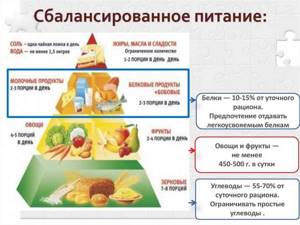
Product pyramid
Disease Prevention
A balanced diet ensures that all the beneficial substances contained in foods contribute to the production of key cells in the immune system that fight harmful microorganisms and significantly improve the vascular system. The immune system relies heavily on blood flow. Therefore, good vascular function will help quickly provide cells that fight diseases with the necessary substances in the right areas. Deficiencies of certain vitamins and minerals can cause immune system dysfunction. For example, vitamin A, C, E, B vitamins, zinc and iron. Therefore, enrich your diet with as many fresh fruits, vegetables and berries as possible.
One of the significant health benefits of a balanced diet is a reduced risk of cardiovascular disease. Thanks to vitamin C, the concentration of good cholesterol increases, and bad cholesterol does not accumulate. This state of affairs protects you from fatty deposits in the walls of blood vessels, the development of atherosclerosis, heart attack, stroke, etc. Vitamin C also lowers blood pressure. Essential fatty acids protect the body from complications after a serious illness.
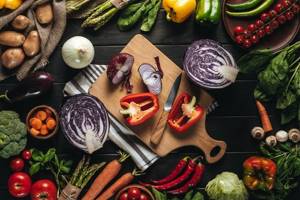
Energy consumption
How much energy a person needs per day depends on his age, gender and type of activity. Food must compensate for energy costs. People who engage in sports or physical work require 4,000 kcal per day. Knowledge workers have half that amount – 2000-2500 kcal. This is due to their sedentary activity. With age, energy consumption decreases. Men have a 5-10% higher metabolic rate than women. To replenish expended energy, you need to adhere to the schedule below.
Energy and activity
The food we eat every day is our fuel. You shouldn’t “throw” whatever you have inside and be irresponsible about the routine of eating and its quality. It has a huge impact on your activity throughout the day. In addition, as you know, one of the main sources of energy is carbohydrates. Complex carbohydrates are digested more slowly. They will provide you with energy for a longer period than simple ones (sweets and flour). The latter give only a sharp jump, and then immediately there is a decline. Ideally, a balanced diet aims to maintain energy levels throughout the day without extreme highs and lows.
Good nutrition keeps your activity level at a relatively steady level from morning to evening. Protein promotes satiety much more effectively than processed foods or simple carbohydrates. If you make it a habit to eat something protein-rich every 4 hours, this will prevent you from accidentally snacking. And also make sure that you have a sufficient amount of healthy fats in your food (vegetable oils, nuts, etc.). These will take your body longer to digest than unhealthy saturated fats.
Iron-rich foods (any greens and vegetables, especially parsley, spinach, broccoli, etc.) increase energy because sufficient iron helps deliver oxygen to working muscles and the brain.

Basic theory
A balanced diet involves a full intake of a variety of foods. This is breakfast, lunch, afternoon snack with dinner and 2-3 more snacks. In general, this is 5-6 meals per day.
In this case, it is necessary to maintain the harmony of the three golden components - proteins, fats and carbohydrates. It is necessary to choose the right products, take care of fortified nutrition, and count calories. And you should take into account your age, active load, gender, energy consumption, chronic illnesses.
You may also be interested in: Food Pyramid of Proper Nutrition
Improves sleep
During sleep, our body recovers on all fronts. Without good and sufficient sleep, a person feels lethargic, tired, and irritated. Concentration also decreases, memory deteriorates and cravings for junk food arise. Poor nutrition often causes stomach and digestive problems due to toxins that are released into the circulatory system. Moreover, increased acidity leads to disruption of the digestive system, which disrupts normal sleep.
A balanced diet teaches you not to overeat in the evening. It also fosters the habit of having lunch and dinner with an eye on your body and its requirements. You will not have problems not only with health, but also with sleep. Although, as you noticed, all these processes are tightly connected, and it is almost impossible to consider them separately from each other.

What is functional nutrition?
Functional nutrition is nutrition with certain foods (which ones - read on), which contain amino acids, lipids, slow carbohydrates, fat- and water-soluble vitamins, minerals necessary for the body at the biochemical level.
Turning to the fundamental work of Konstantin Monastyrsky, who researched and described the phenomenon of functional nutrition, we find the following words:
... this is nutrition that gives the body everything it needs and does not give anything that harms it. (K. Monastyrsky, “Fundamentals of absolute health and longevity. Functional nutrition”)
The supply of key nutrients to the body ensures the full functioning of biochemical systems at the cellular level, thanks to which functional nutrition not only helps to lose weight, but also improves health and prolongs life.
The functional style of nutrition is maximally adapted to the biochemical needs of the body for systematic self-renewal. (K. Monastyrsky, “Fundamentals of absolute health and longevity. Functional nutrition”)
The functional nutrition system is aimed at solving the following main problems of modern overweight people:
- Poor nutrition. The problem is caused by an active rhythm of life, a busy schedule, frequent fast food snacks, and access to fatty and fried foods on every corner. If you include functional nutrition in your life, you will develop the habit of choosing the right foods that are beneficial for every cell of the human body;
- Eating low quality food. Modern food consists of a large number of dyes, preservatives, and flavorings. Such foods do not saturate the body, but only temporarily smooth out the feeling of hunger, which returns again after a few hours. Functional nutrition promotes the consumption of organic, environmentally friendly products, devoid (as far as possible) of chemical components, as if returning a person to a primitive time when taste enhancers did not exist;
- Presence of diseases. Obesity (for reasons of functional nutrition) occurs due to insufficient activity of the digestive system, lack of a sufficient amount of essential microelements, amino acids, vitamins, and so on in the diet. Often the functioning of the gastrointestinal tract is disrupted due to illnesses. In the forefront are gastritis, ulcers, pancreatitis, diseases of the bile production and excretion system (cholecystitis, cholelithiasis, acholia, and so on), and other diseases.
If you normalize your diet, you will not only lose extra pounds, but also improve your health, restore impaired functions of the gastrointestinal tract, and prolong your youth.

Active brain activity
So, what could be more important than the good functioning of our brain? You can also maintain its functionality through the foods you eat. Omega-3 fatty acids improve memory and promote learning. They also help fight debilitating mental disorders such as depression, dementia and schizophrenia. Therefore, include red fish, walnuts, avocado and kiwi in your diet. And garlic accelerates blood circulation, so the brain is better supplied with oxygen, and you think faster. Berries are natural antioxidants, with the help of which the brain stores and processes information. They also protect cells from destruction.

Text:
Tips on how to eat rationally
Proper nutrition is important for a healthy lifestyle and normal weight.
There is a formula for determining your body mass index, which you can use to calculate your ideal weight. It is simple: you need to divide your weight by the square of your height in meters. An indicator from 19 to 25 is considered ideal.
If your weight is not ideal, you need to adjust your diet. But while reducing calories, you cannot break the ratio of proteins, fats and carbohydrates. Otherwise, the lack of macroelements will result in negative consequences, which include fatigue, irritability and the return of kilograms in the event of a breakdown. That is why it is important that our food is not only healthy and nutritious, but also balanced.
Optimal meal plan
Breakfast is the most important meal of the day and should not be skipped. The calorie content of breakfast should be 400 kcal.
The following products must be selected for the joint venture. The best option is porridge: buckwheat, corn, oatmeal. It is recommended to add berries, fruits, honey and nuts to it.
For lunch, vegetable dishes and side dishes of cereals and hard pasta would be appropriate. Fresh herbs and mushrooms are tasty and healthy.
It is best to have a light vegetable salad and protein foods for dinner. If you really want to eat before bed, you can snack on a small handful of almonds. It is rich in protein and magnesium, helps relax muscles and helps you fall asleep quickly.
Approximate menu for a week
A sample menu for the week would look like this:
- Breakfast dishes:
- porridge with honey or cottage cheese, juice from natural fruits;
- sandwich with low-fat cheese, tea, 1 large orange;
- nuts, casserole (cottage cheese), green tea;
- omelette, shortbread cookies, tea;
- pancakes with curd filling, coffee beans, tangerines.
- Lunch dishes:
- chicken broth with noodles, vegetable salad, baked turkey;
- mushroom soup, vegetable stew, fruit salad, juices;
- buckwheat soup, oatmeal, boiled beef, berry juice;
- vegetable soup, steamed fish, bread (without yeast), compotes;
- beans, boiled meat, vegetable salad, fruit.
- Dishes for dinner:
- seafood salad, cottage cheese casserole with carrots, compote;
- porridge, vegetable salad;
- boiled chicken fillet, Greek salad, green tea;
- vinaigrette seasoned with sunflower oil, baked fish, 100 g of cottage cheese;
- stewed vegetables, jelly.
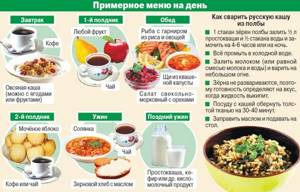
Menu for the week, budget option
The weekly diet can be displayed in the following table:
| Monday | Z.: 100 g of oatmeal with the addition of 0.5 tsp. honey, applesauce. A: salad of tomatoes, cucumbers and radishes, seasoned with homemade yogurt, 150 g of baked fish. U.: 3 cheesecakes, dried fruit compote. |
| Tuesday | Z.: 1 cup of coffee without additives, a slice of dry bran bread with butter. A: 3 boiled potatoes, sprinkled with dill, dates, tea. U.: vegetable stew, 100 g of stewed cod. |
| Wednesday | Z.: Omelet with tomatoes and bell peppers. A: Brown rice, corn. U.: salad of Chinese cabbage, cucumbers and dill with olive oil. |
| Thursday | Z.: fruit salad with low-fat yogurt. A: broccoli soup, 2 fresh cucumbers, a slice of cheese. U.: cabbage salad with sour cream (15%), 80 g chicken meat. |
| Friday | Z.: black coffee, 1 boiled egg, Chinese cabbage salad. A: 2 boiled potatoes, 3 fresh cucumbers, cheese. U.: 100 g of buckwheat porridge and the same amount of grilled flounder. |
| Saturday | Z.: green tea (unsweetened), vegetable salad. A: 200 g turkey, baked with tomatoes and cheese. U.: 200 g of vegetable stew without salt and spices, carrots and apple in salad for dinner. |
| Sunday | Z.: tea, bread with jam, dried fruits. A: vegetable soup, green bean salad. U.: Noodles with cabbage, omelette. |
Sample menu for a week for losing weight
To lose weight, you need to eat a balanced diet and eat low-calorie foods.
| Reception food Day | Breakfast | Dinner | Dinner |
| Monday | 1 glass of fresh juice or water on an empty stomach, oatmeal with honey and nuts, rye bread. | Fish (steamed or stewed), tea without sugar, boiled potatoes. | Steamed vegetables (starch-free). |
| Tuesday | 100 g low-fat cottage cheese with dried fruits, tea, boiled egg. | Boiled veal, vegetable soup, juice. | Half an avocado, low-fat cottage cheese or kefir. |
| Wednesday | 2 grain breads with cheese, tea with lemon balm, ginger or mint. | 200 g boiled chicken fillet, steamed asparagus, orange juice. | Vegetable salad with rye bread. |
| Thursday | 2 grain breads, low-fat yogurt, juice. | 150 g boiled or baked red fish. | Boiled chicken breast with herbs. |
| Friday | Green tea, 3 slices of low-fat cheese, porridge with dry fruit. | Chicken broth, steamed vegetable sauté. | 150 g fish fillet or cottage cheese. |
| Saturday | 150 g boiled chicken fillet, tea, bread. | Vegetable salad with cheese, mint tea or fresh juice, bread, pasta with tomato paste, | Ryazhenka or drinking yoghurt (unsweetened). |
| Sunday | Porridge with fruit, apples, juice. | 150 g lean meat, steamed cauliflower or broccoli, still water. | Bean salad with red pepper. |
Approximate daily menu for a week to maintain weight at the same level
To keep yourself in good shape, you should do a set of exercises and diet every day. Sample menu:
| Reception food Day | Breakfast | Dinner | Dinner |
| Monday | Tea with cottage cheese and dried fruits. | Buckwheat with lean boiled meat, vegetable salad, whole grain bread. | 3 types of stewed vegetables (your choice). |
| Tuesday | Cheese, porridge with honey and fruit, herbal tea. | Meat broth, steamed fish, yeast-free bread. | Vegetable salad, boiled chicken fillet. |
| Wednesday | Omelet, toast, juice. | Spaghetti with sauce, mushroom soup. | Stewed meat, vinaigrette. |
| Thursday | Cottage cheese, porridge with fruit and milk, tea. | Lasagna, spinach cream soup. | Salmon baked in foil. |
| Friday | Tea, oatmeal with honey and nuts. | Chicken broth, boiled potatoes with herbs. | Sea food salad, bran bread. |
| Saturday | 2 toasts with lean cheese, juice. | Boiled meat with beans. | Vegetable salad with vegetable oil. |
| Sunday | Buckwheat with milk. | Vegetable soup, boiled meat, bread. | Carrot casserole, juice. |
Example of a daily diet
A balanced breakfast plays an important role in a complete diet. Approximate diet:
| Reception food Day | Breakfast | Dinner | Dinner |
| Monday | Millet porridge with raisins. | Lenten cabbage soup. | Salad of cucumbers and tomatoes with herbs and olive oil. |
| Tuesday | Banana smoothie. | Vermicelli soup with breadcrumbs and dill. | Zucchini stewed with pumpkin. |
| Wednesday | Pumpkin, corn porridge. | Spinach soup with beans and broccoli. | Grilled Brussels sprouts. |
| Thursday | Oatmeal with banana. | Buckwheat porridge, broccoli, soy cutlet. | Vegetable okroshka. |
| Friday | Barley porridge with berries. | Pickle with mushrooms. | Brown rice, vegetables, seaweed and seafood salad. |
| Saturday | Oatmeal pancakes. | Steamed cauliflower, red beans, mushrooms. | Vegetable stew. |
| Sunday | Semolina porridge and apple baked with cinnamon. | Pasta with tomatoes, mushrooms, herbs. | Mix of lettuce, tomatoes, green peas with olive oil, soy pate. |



